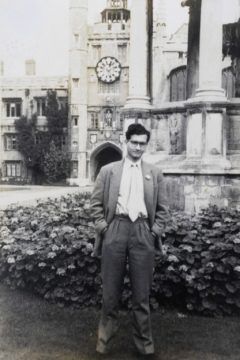Christina Pazzanese in The Harvard Gazette:
 Coming from a long line of Hindu intellectuals and teachers, Amartya Sen enjoyed advantages and freedoms that few others did in a deeply-stratified India of the 1930s, during the waning days of the British empire. Teaching was in his blood, and from an early age, Sen was struck by the stark economic inequities he saw all around him under the British raj. Identifying and understanding the causes and effects that inequalities, like those surrounding poverty or gender, had on people’s lives would become a lifelong intellectual lodestar for the political economist, moral philosopher, and social theorist. Many economists focus on explaining and predicting what is happening in the world. But Sen, considered the key figure at the convergence of economics and philosophy, turned his attention instead to what the reality should be and why we fall short. “I think he’s the greatest living figure in normative economics, which asks not ‘What do we see?’ but ‘What should we aspire to?’ and ‘How do we even work out what we should aspire to?’” said Eric S. Maskin ’72, Ph.D. ’76, Adams University Professor and professor of economics and mathematics.
Coming from a long line of Hindu intellectuals and teachers, Amartya Sen enjoyed advantages and freedoms that few others did in a deeply-stratified India of the 1930s, during the waning days of the British empire. Teaching was in his blood, and from an early age, Sen was struck by the stark economic inequities he saw all around him under the British raj. Identifying and understanding the causes and effects that inequalities, like those surrounding poverty or gender, had on people’s lives would become a lifelong intellectual lodestar for the political economist, moral philosopher, and social theorist. Many economists focus on explaining and predicting what is happening in the world. But Sen, considered the key figure at the convergence of economics and philosophy, turned his attention instead to what the reality should be and why we fall short. “I think he’s the greatest living figure in normative economics, which asks not ‘What do we see?’ but ‘What should we aspire to?’ and ‘How do we even work out what we should aspire to?’” said Eric S. Maskin ’72, Ph.D. ’76, Adams University Professor and professor of economics and mathematics.
Over his 65-year career, Sen’s research and ideas have touched many areas of the field. He’s credited as one of the founding fathers of modern social-choice theory with his landmark 1970 book, “Collective Choice and Social Welfare.” The book took up the late Harvard economist Kenneth Arrow’s ideas from the early 1950s about how to combine different individuals’ well-being into a measure of social well-being, intensifying interest in and expanding upon Arrow’s work.
“It was really Amartya who made the field what it became,” said Maskin, a 2007 Nobel laureate in economics who has taught with Sen, the Thomas W. Lamont University Professor and professor of economics and philosophy, since the 1990s.
Sen’s 1970 paper, “The Impossibility of a Paretian Liberal,” was deeply influential on philosophy and economics. In it, he pointed to an inherent conflict between individual liberty and the principle that making people better off is always desirable.
More here. (Note: Thanks to Iqbal Riza)
